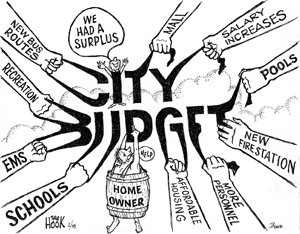NEWS- Up 4 percent: City budget jump lowest in decade
 While Albemarle County tightens its belt and tells schools to soldier forward under an ever-growing shortfall, Charlottesville's coffers are still flush. Its school budget will be fully funded, and most likely will have a few extra million thrown at it, despite a recent study indicating the City has one of the lowest-achieving, highest-cost school systems in the state.
While Albemarle County tightens its belt and tells schools to soldier forward under an ever-growing shortfall, Charlottesville's coffers are still flush. Its school budget will be fully funded, and most likely will have a few extra million thrown at it, despite a recent study indicating the City has one of the lowest-achieving, highest-cost school systems in the state.
City Manager Gary O'Connell presented his fiscal year 2008-2009 budget February 13, stressing that the $6.33 million increase in spending is the lowest– 4.21 percent– Charlottesville has seen in a decade. Certainly, the $127.3 million operating budget represents a smaller hike than last year's heftier 12 percent increase.
Of course, that was the same year real estate assessments rose an average of 15 percent, and O'Connell acknowledges the correlation between higher taxes and higher city spending.
The good news for beleaguered city homeowners is that while the average assessment went up 4 percent, one third of residents saw no increase or a reduction in assessments, O'Connell says. And the budget is based on the current 95 cents per $100 assessed value tax rate, down from its mid-1990s high of $1.11 and lowered another 4 cents by City Council last year.
"Council asked for a budget under 5 percent," he says. "This is the lowest increase in almost 10 years. The budget has had double-digit increases the past five years."
On the housing front, the proposed budget raises the tax grant program for people who need help paying their ever-increasing property taxes. Homeowners whose houses are worth $365,000 or less (criminy– Charlottesville's median house price was $280,000 in 2007) and whose household incomes are $50K or less can get help with their property taxes. O'Connell notes that two-thirds of the houses in the city fall in the $365,000-or-less category.
The City Manager emphasizes that he's not cutting any services; in fact, he says he's introducing new services like two new bus routes and dedicated emergency medical teams. The latter proved controversial last year when Council approved nearly $1 million to hire its own ambulances and pay its own staff to supplement the all-volunteer Charlottesville Albemarle Rescue Squad.
"The Fire Department is now a first responder and ran 2,500 EMS calls last year," says O'Connell. "This budget proposal is with less people– six instead of eight last year." Billing health insurance companies is one way the City is talking about paying for the broadened EMS response, as is Albemarle County. Interestingly, the city's FY 2006-2007 budget eliminated five positions in the fire department.
On the staffing front, the City plans to add a new building inspector whose salary will be funded by construction fees, according to O'Connell. The budget also slices one assistant city manager position from his staff– although former city spokesman Maurice Jones will still come on as assistant city manager.
The budget puts $1.4 million toward affordable housing, perhaps to mollify Mayor Dave Norris, who wanted the City to devote one percent of its budget to affordable housing, a notion O'Connell opposed and which Council shot down in a 2-3 Council vote. "I'm recommending at least $1 million for next year," says O'Connell.
Other perks citizens can look forward to: new pools! A new Smith Pool eats up $5 million of the capital budget, and a new Onesty pool will cost $3 million. Another $3 million goes toward Downtown Mall construction projects, although that line item will make some downtown denizens nervous, given the debacle that's closed Third Street for months longer than originally planned.
City employees will get a four percent raise with the proposed budget, same as last year.
The budget fully funds the School Board's request of $39.78 million, unlike poor Albemarle County schools, which are looking at a $1.3-million-and-growing shortfall. And, historically, the City tosses a few extra million above and beyond what's requested, thanks to City Council's goal to give schools 40 percent of all new revenues, whether the schools need it or not. Last year, such generosity put an extra $4.3 million in the schools' checking account.
Such largesse has drawn criticism, particularly in light of a recent efficiency study by the Claire Booth Luce Policy Institute that puts Charlottesville schools in the category of worst performance at the highest cost in the state: $183.69 per point of achievement per student. (Albemarle ranks in the second-highest category in achievement– but it spends $122.99 per student, which puts it in the worst cost-efficiency category of the better-achieving schools.)
"There's no accountability for the money," blasts former city councilor Rob Schilling. "I had a School Board member tell me off the record, 'We don't know how to spend it.'" Schilling also notes that the Charlottesville school population is falling.
City school spokeswoman Cass Cannon says the Luce study relied on old data from 2004-2005. "We're no longer in the worst," she points out, although the move raises Charlottesville from a "lowest" achieving district up to "poor."
'Traditionally Charlottesville schools have favored lower student-to-teacher ratios and spending on the fine arts," explains Cannon. "That commitment shows we spend more money per student. We're improving."
The City is also giving Superintendent Rosa Atkins a break as a new administrator. Atkins arrived in mid-2006 following the tumultuously brief tenure of Scottie Griffin. "Everyone feels the schools are heading in the right direction," says Cannon. "We're giving her the benefit of the doubt to catch up."
Schilling says he's "offended" by the budget and calls it "the same song and dance we get every year." In particular, he claims that O'Connell threatens to cut services every year and then ends up with a surplus that in the past two years has totaled around $15 million. "That's dishonest budgeting," says Schilling. "Take those monies and whack it off the tax rate," he suggests.
But O'Connell says the budget meets City Council's strategic vision by focusing on education, affordable housing, environmental sustainability, and youth recreation.
And world class cities don't come cheap.

City Council has until April 15 to approve City Manager Gary O'Connell's FY 2009 budget, naturally with plenty of citizen input.
FILE PHOTO BY JEN FARIELLO
#